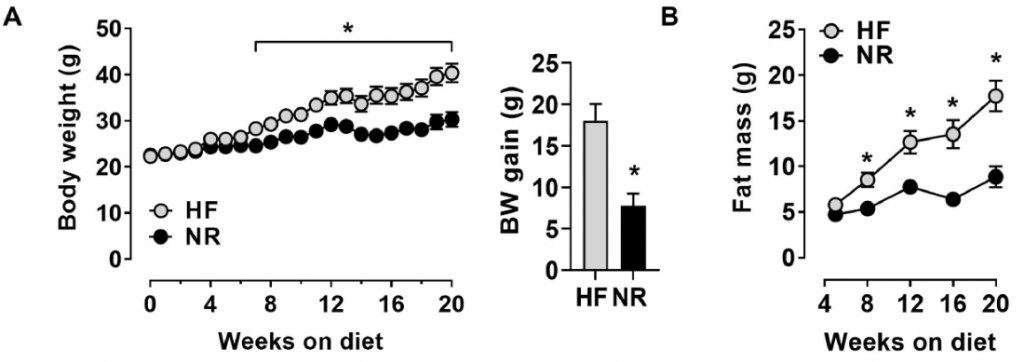Key Points:
- NR supplementation decreases weight gain, fat mass accumulation, and elevation in cholesterol associated with obesity and aging.
- Supplementation with NR reduces inflammation, a hallmark of aging, in fat tissue.
- NR treatment also elevates metabolism and enhances physical activity levels.
Nicotinamide riboside (NR) is a molecule capable of raising the declining levels of nicotinamide adenine dinucleotide (NAD+) associated with aging. Numerous studies have shown that raising NAD+ levels with precursors like NR can slow down the aging process and prevent age-related diseases. Now, a new study has looked at how NR supplementation affects diet-induced weight gain in aging mice.
The study, a collaboration between the University of Connecticut and Changwon National University in Korea, published in The Journal of Nutritional Biochemistry, examined the effect of NR on female mice fed a high-fat diet. Kim and colleagues found that in young mice, NR helped to increase NAD+ levels in the liver. In old mice, NR reduced body weight, fat mass, and activation of inflammatory genes. Additionally, old mice fed NR showed increased rates of metabolism and increased activity levels, which could be responsible for preventing obesity.
“Thus, our results indicated that NR supplementation exerted an anti-obesity effect and prevented the development of inflammation in the [fat tissue] of old, but not young, female mice with diet-induced obesity,” the investigators wrote.
NR Prevents Weight Gain and High Cholesterol
Young mice (8 weeks – approximately 20 years in human years) and older mice (16 weeks – approximately 26 years in human years) were fed a high-fat diet with or without NR supplementation (400 mg/kg/day) for 20 weeks. Kim and colleagues found that NR supplementation increased liver NAD+ levels, likely contributing to the benefits of NR. Meanwhile, old mice treated with NR had less weight gain and fat mass accumulation compared to mice not treated with NR. Additionally, total cholesterol was reduced by supplementing with NR.

Kim and colleagues also found that NR supplementation led to smaller fat cell size and decreased fat cell inflammation. Furthermore, the old female mice supplemented with NR had higher metabolic rates – the amount of energy expended over a specific period of time, higher energy expenditure, increased physical activity (measured by ambulatory movement), and enhanced voluntary exercise (indicated by running wheel counts) performance.

NR Supplementation for Obesity in Women
The investigators suggest that the increased metabolism and physical activity seen with NR supplementation in older female mice may be contributing to obesity prevention. Whether this translates to humans remains to be seen, but a small study done on obese humans showed that NR supplementation can minorly affect body composition and sleeping metabolic rate, although it looked at merely 13 individuals. Other NAD+ precursors like nicotinamide adenine dinucleotide (NMN) may also have anti-obesity effects.
NR supplements are easily found at most vitamin and supplement retailers and may provide benefits to obese women, including weight loss due to increased metabolic rates. The same benefits may not be seen in males who choose to supplement with NR, at least based on this research. Larger studies in humans are needed before we can make fully formed opinions with regards to the anti-obesity effects of NR supplementation.